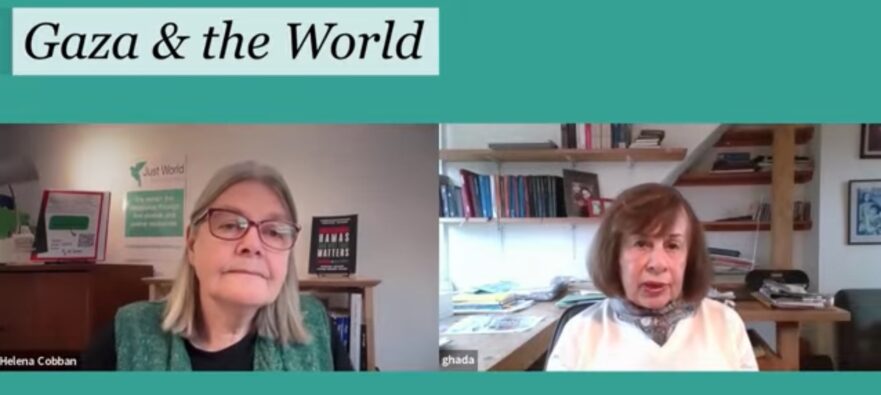On November 11, JWE president Helena Cobban sat down (virtually) with the veteran British-Palestinian justice activist Dr. Ghada Karmi in the latest episode of our video podcast series “Gaza & the World.”
Dr. Karmi is a British-Palestinian who had a strong career in London as a physician and a medical historian; then between 2002 and 2023 published four thoughtful books that explored her own personal experiences as a member of the Nakba generation and a steadfast activist for Palestinian rights– and also, the broader realities faced by Palestinians inside and outside the homeland. Her most recent non-fiction book was One State: The Only Democratic Future for Palestine-Israel.
In the podcast conversation, Dr. Karmi surveyed the political tempests that Israel’s genocide in Gaza, and the UK government’s deep involvement in Israel’s actions, have sparked within British politics.
She described key aspects of her work as a juror of conscience at the recently concluded Gaza People’s Tribunal in Istanbul. And she explored the harsh strategic choices that Palestinians have faced for decades, recounting some of the disturbing experiences she had when she briefly worked as a consultant to the “Palestinian Authority” in Ramallah, in 2005.
You can watch this whole 47-minute conversation on YouTube, here. You can listen to the audio on Apple Podcasts, Spotify, or Buzzsprout. Or you can download the transcript (PDF), here.
Describing her role as a juror of conscience at the Gaza People’s Tribunal in Istanbul, Dr. Karmi recalled that for two or three days she and her five fellow jurors, “had to sit through from the beginning of the day to the end of the day, testimony after testimony of suffering of different dimensions to the assault by Israel on the people of Gaza. It was harrowing… It was harrowing, painful. But of course, it was necessary. We had to do that. We had to do that.”
“Only one word went through my mind as I listened to this [testimony],” she said. “Diabolical! This was a diabolical project. The Israeli project to destroy Gaza so fundamentally, so irreversibly, can only be called diabolical.”
She added:
It was very clear to us… that the problem with Gaza and the problem which Israel has caused for the people of Palestine and for the region is Zionism. It’s an ideology of Zionism, which rules the policymaking of Israelis and dictates these really diabolical things that they do to the Palestinians and to the surrounding Arab states as well. It’s Zionism.
Now, it was so clear to us that we had to point this out… that genocide was one aspect of the results of Zionism, but it was only one outcome. All the other ills that have afflicted the Palestinians and the region, I hasten to add, all these stem from this particular ideology. And so, of course, it wasn’t too difficult for us to come to our final conclusions and recommendations, that since Zionism is the problem, the way forward which we wanted for the world to take on, and as you say, all the states, not just the ones that actively colluded with Israel’s genocide, but all the others either standing by or apparently indifferent… All of these have to work together to dismantle Zionism. Now, that meant dismantling all the structures, the institutions that keep Zionism going.
So, in the end, the Zionist state would, of its own accord, be dismantled. Now, nobody talked about destroying Israel or killing Israelis or any of that. Our recommendations were completely logical, and they stemmed from the case we’d already made for the way in which Zionism had been responsible for all these crimes.
Indeed, in the Final Statement that the GPT Jury of Conscience issued on October 26 (download PDF here) the jurors called for, “a global, rights-based strategy to dismantle Zionist structures: identify and map the Zionist regime’s sources of power and enabling pillars.” And they added this strong affirmation:
The Jury affirms that the struggle is with Zionism as a racist, supremacist, settler-colonial enterprise— not with Jews or Judaism. The strategic horizon is a single rights-based political order grounded in equality, decolonization, restitution, and the unfettered right of return. Only this course can end the ongoing genocide and open a path to a just and durable peace for all who live in Palestine and beyond.
In her conversation with Ms. Cobban, Dr. Karmi recast the terms of the lengthy debate between those who advocate for a “one-state” or a “two-state” outcome by referring a number of times to the need to reconstitute the formally unified Palestinian polity that had existed before the UN’s Partition Plan of 1947 and the brutal campaigns of the Zionist/Israeli fighting units that chased her and her family out of their Jerusalem home during that period.
“I do not in any way give up on the ultimate necessity for the reconstitution of Palestine,” she said. “The people who live currently in Palestine and all the Palestinians who belong there and were expelled from it, all these people have to live together in one democratic structure.” She warned, however, that, ““Time is not on the side of the Palestinians.”
Do listen to, or watch, or read the transcript of, the whole of this conversation. And be sure to share it with your friends!

